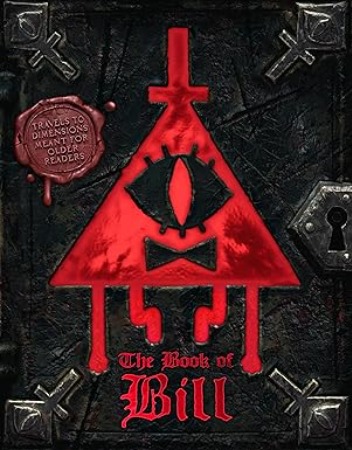Unveiling the Madness: The Story Behind 'The Book of Bill (Gravity Falls)'
Discover the enigmatic bestseller 'The Book of Bill (Gravity Falls)' by Alex Hirsch, exploring the chaotic mind of Bill Cipher, the infamous demon from the beloved animated series. This deeply cursed tome combines dark humor, genuine terror, and philosophical musings, making it a must-read for fans and curious readers alike.
Table of Contents
Unveiling the Madness: The Story Behind "The Book of Bill (Gravity Falls)"
Introduction: An Enigmatic Bestseller
"The Book of Bill (Gravity Falls)" isn't just another spin-off from a beloved animated series; it's a phenomenon. The book instantly clinched the #1 spot on The New York Times bestseller list, capturing the imaginations of both dedicated fans and casual readers. But there's more to this chaotic tome than meets the eye. Penned by Alex Hirsch, the creative genius behind Gravity Falls, and purportedly narrated by the show's infamous demon, Bill Cipher, this book ventures into realms previously uncharted in children’s entertainment.
The Genesis of Bill Cipher
To truly understand "The Book of Bill," one must delve into the origins of Gravity Falls itself. Alex Hirsch, a graduate from The California Institute of the Arts, conceived the show as a way to encapsulate the mysterious and whimsical summers he spent with his own twin sister. With a knack for blending the eerie with the comedic, Hirsch introduced viewers to a world teeming with cryptic symbols, hidden messages, and multi-layered characters.
Bill Cipher, the triangular antagonist of the series, quickly became a fan favorite. His malevolent charm and cryptic nature set him apart as one of the most memorable villains in modern animation. It's no surprise that Hirsch chose to explore Bill’s psyche further in a dedicated book.
The Creative Process: A Dance with Madness
When creating "The Book of Bill," Hirsch had to walk a fine line. He needed to maintain the essence of Bill Cipher’s chaotic evil while making the content engaging for readers. The book promises a treasure trove of baffling riddles, uncrackable ciphers, and even ways to cheat death. True to its word, it’s a deeply cursed tome, a testament to Hirsch's ability to weave dark humor and genuine terror seamlessly.
Despite humorous disclaimers, Hirsch’s endeavor to channel Bill’s voice raises an intriguing question: How did he manage to so effectively capture the malevolence and insanity of an extra-dimensional demon? While Hirsch humorously denies any demonic possession, his immersive writing suggests a deep, almost unsettling connection with the character.
The Cultural Impact: A Dark Reflection
"The Book of Bill" is not just a whimsical read; it’s a reflection of our fascination with the unknown and the sinister. The endorsements by notable figures like "Weird Al" Yankovic, Guillermo del Toro, and Charlie Day add layers to its mystique. Yankovic’s hyperbolic warning and del Toro’s eerie caution juxtapose perfectly with Day’s enthusiastic endorsement, creating a sense of forbidden allure around the book.
Moreover, the book travels to dimensions meant for older readers, hinting at mature themes and deeper philosophical questions. Bill Cipher’s influence on human history and his sinister effects on the Pines family mirror our own world’s historical enigmas and familial secrets. It’s a reminder that every story has a dark side, and every mystery, a sinister undertone.
The Unknown Side: A Meta-Narrative
One cannot overlook the meta-narrative at play in "The Book of Bill." By allowing Bill to "write" the book, Hirsch blurs the lines between creator and creation, reality and fiction. This meta-approach invites readers to question the nature of authorship and narrative control. Is Hirsch merely a vessel for Bill Cipher’s chaotic musings, or is he the true puppet master, manipulating the strings from behind the scenes?
This meta-narrative resonates deeply in our postmodern world, where the boundaries between truth and fiction are increasingly nebulous. Hirsch's playful yet dark storytelling is a commentary on the very act of storytelling, challenging readers to decipher the truth amidst the chaos.
Conclusion: A Cursed Treasure
"The Book of Bill (Gravity Falls)" is a masterstroke of creative genius. Alex Hirsch’s ability to resurrect an infamous villain and imbue a book with his chaotic essence is nothing short of remarkable. While the book's warnings about its dangerous nature add to its allure, they also serve as a testament to Hirsch’s skill in crafting a narrative that is as unsettling as it is captivating.
Whether you’re a die-hard fan of Gravity Falls or a curious reader enticed by the book’s dark promise, "The Book of Bill" offers an unforgettable journey into the mind of one of animation’s most enigmatic characters. But beware: once you make a deal with Bill, it’s not so easily undone.
In the end, "The Book of Bill" isn’t just a book; it’s an experience, a cursed treasure waiting to be unearthed. And as with all treasures, it comes with its own set of dangers. Enter at your own risk.
